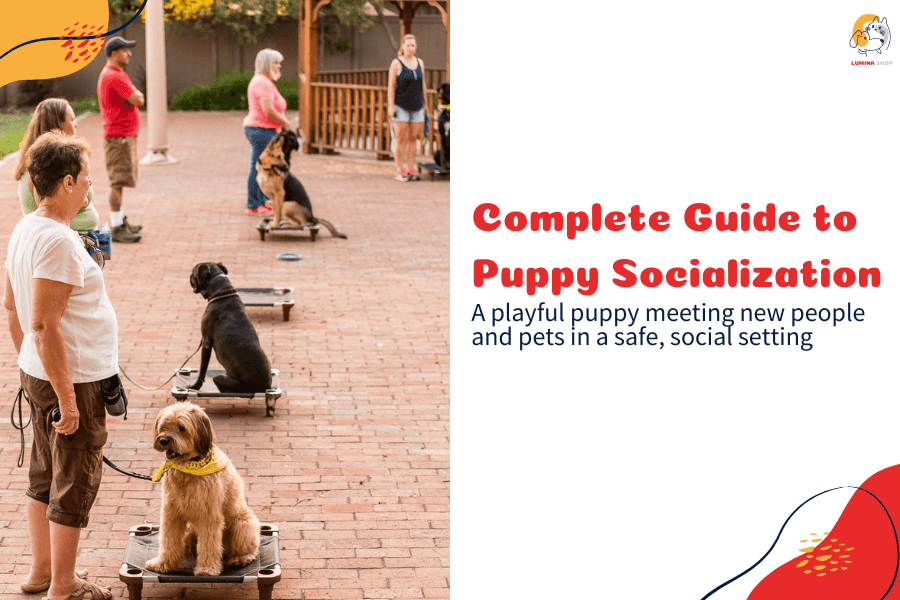
How Can I Socialize My Puppy Properly?
Socialization is one of the most important parts of raising a well-adjusted dog. A properly socialized puppy grows into a confident, friendly, and well-behaved adult dog that can handle new experiences, people, and environments without fear or aggression.
But how do you socialize your puppy properly? This guide covers why socialization is important, when to start, and step-by-step techniques to help your pup feel comfortable in any situation.
Recommended Product:
Interactive Puppy Toys – Great for socialization through play!

1. Why Is Puppy Socialization Important?
Proper socialization helps your puppy:
✔ Reduce Fear & Anxiety – Prevents nervousness around new people, pets, or situations.
✔ Improve Behavior – Reduces aggression, excessive barking, and destructive habits.
✔ Adapt to New Environments – Helps them stay calm in unfamiliar places.
Puppies that aren’t socialized may develop fear-based aggression, nervousness, or behavioral issues later in life.
Recommended Product:
Calming Treats for Puppies – Helps ease stress in new situations.

2. When Should You Start Socializing Your Puppy?
The best time to start socializing your puppy is between 3-14 weeks old. This is known as the critical socialization period, when puppies are most open to new experiences.
✔ 3-6 Weeks – Puppies begin interacting with littermates and their environment.
✔ 6-12 Weeks – The prime time for introducing people, sounds, and safe social experiences.
✔ 12-16 Weeks – Continue socialization with controlled playdates and outdoor adventures.
If your puppy is older, don’t worry! Socialization is still possible with patience and positive reinforcement.
Recommended Product:
No-Pull Puppy Harness – Helps with safe outdoor exploration.

3. How to Socialize Your Puppy Step by Step
1. Introduce New People & Environments
Expose your puppy to different types of people, including children, men, women, and people wearing hats or sunglasses.
🐶 Pro Tip: Have visitors offer your puppy a treat to create positive associations with strangers.
2. Expose Your Puppy to Different Sounds
Introduce household and outdoor noises like:
✔ Vacuum cleaners
✔ Car horns
✔ Doorbells
✔ Thunderstorms
Play recordings of scary sounds at low volume and reward calm behavior.
3. Arrange Puppy Playdates
Let your puppy interact with friendly, vaccinated dogs in a safe setting. This helps teach bite inhibition, body language, and social skills.
🐶 Pro Tip: If your puppy seems nervous, let them observe first before jumping into play.
Recommended Product:
Puppy Playpen – Provides a safe space for controlled interactions.
4. Take Short, Positive Walks
Gradually introduce your puppy to:
✔ Different surfaces (grass, pavement, sand)
✔ Busy sidewalks
✔ Pet-friendly stores
Use a leash and harness for safety, and reward calm behavior with praise or treats.
5. Handle Your Puppy Regularly
Get your puppy used to:
✔ Paw handling (for nail trims)
✔ Ear checks (for vet visits)
✔ Brushing (for grooming)
Start slow and reward them with a treat for staying calm.
Recommended Product:
Soft Puppy Brush – Gentle on sensitive puppy fur.

4. Common Socialization Mistakes to Avoid
-Rushing the Process – Go at your puppy’s pace. Too much at once can be overwhelming.
-Forcing Interactions – Let your puppy approach new things at their own comfort level.
-Skipping Socialization After 4 Months – Continue exposing your puppy to new experiences even as they grow.

5. When to Seek Professional Help
If your puppy shows excessive fear, aggression, or anxiety, a professional trainer or behaviorist can help with structured socialization exercises.
Look for trainers who use:
✔ Positive reinforcement
✔ Fear-free training methods

Conclusion
Proper socialization helps puppies become confident, well-mannered dogs. Start early, introduce new experiences gradually, and use positive reinforcement to make socialization fun.
For training treats, interactive toys, and calming aids, check out Lumina Pet Shop!
Help your puppy explore the world with confidence! 🐶🌍
